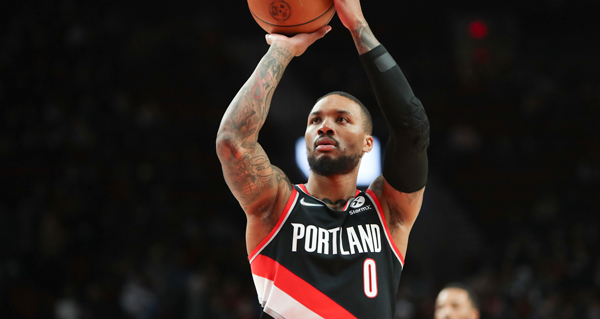Sometimes, good intentions and loyalty can pay off with a breakthrough. Other times, that same loyalty can end up being the only thing worth holding on to.
Damian Lillard and the Portland Trail Blazers are stuck with the latter. After revamping Lillard’s supporting cast in the summer, the Blazers started the season 16-12 and appeared to be on track for a return to the playoffs. Since then, they’ve gone 16-31 to slip from the Western Conference’s No. 4 seed to the league’s fifth-worst record (32-43). Four years removed from 2019’s Western Conference finals appearance, the Trail Blazers will miss the playoffs for the second straight season.
While peers such as Steph Curry, Chris Paul and LeBron James ramp up for the playoffs, Lillard has been shut down for the remainder of the season. For a competitor like Lillard, this must be agonizing. Prior to last season, Lillard had made the playoffs every year since his rookie campaign. Now the man who has delivered some of his generation’s most iconic postseason moments will watch from home for the second year in a row while his team positions itself in the draft lottery.
All of this prompts a familiar question: Will there come a point when Lillard and the Blazers must part ways? And, more urgently, is that point this summer?
This question has hovered over the Blazers through multiple iterations, coaches, co-stars and general managers. Lillard, for this reason, seems one-of-a-kind. The rare superstar in today’s era that stays. But one can only wonder if even Lillard’s journey will succumb to the accelerated pressures of the NBA and end elsewhere.
At 32, it can be argued Lillard has never been better, posting a career-high 32.2 points per game and 64.5 true shooting percentage. Yet his supporting cast doesn’t look like one typical of surrounding a star smack-dab in his prime. After more experienced teammates Josh Hart and Gary Payton II were traded away at the deadline, all of Lillard’s teammates are 28 years old or younger. Among the eight teammates on pace to play at least 1,000 minutes, five are aged 25 or younger.
Young guards Anfernee Simons and Shaedon Sharpe have offered glimpses of exciting upside, but are 23 and 19 years old. Simons has registered only token playoff minutes in his earliest years and Sharpe is a rookie. A rebuilding team would be thrilled to have Simons and Sharpe anchor its backcourt for the next decade, but the Trail Blazers are being prodded by Lillard’s basketball mortality.
“That’s not what I’m interested in,” Lillard recently told reporters when asked about his teammates building winning habits in a loss. “Especially at this stage of my career.”
It’s hard to blame either party for their current position, whether it’s Portland trying to better its chance at a top draft pick, or Lillard distancing himself from a young team’s moral victories. The question is whether continuing the partnership serves either’s own interest.
Few players impact the game the way Lillard can. He’s the closest thing to Steph Curry outside of the Bay Area, and adding his scoring, spacing and leadership could transform a veteran playoff team to a contender overnight.
So far, Lillard has refuted every rumor that he might demand a trade and in the past spurned the idea of joining a super team. On JJ Redick’s podcast this year, he made headlines when he took aim at “ring culture” and said winning championships isn’t the only thing that matters. Lost in the shuffle after the episode, however, was this: “I want the competition. I want to know what it feels like to win.”
This is someone who relishes the opportunity to compete at the highest level and, lately, hasn’t. Instead, he gave the Blazers the benefit of the doubt and a chance to retool. In the era of stars asking out at the first sign of a rebuild, Lillard’s patience was refreshing. It also cost him two years of his prime.
Despite Lillard’s loyalty, it’s fair to wonder if he’d be amenable to going into another season with a similar roster after witnessing its limits. It’s no secret that the Trail Blazers need an influx of talent, but what kind of talent they seek this summer could determine the franchise’s direction and Lillard’s future.
The results of the upcoming NBA draft lottery loom over all of this. The Trail Blazers currently have the fifth-best odds, with a 9.8% chance of landing the No. 1 pick (and the right to select generational French talent Victor Wembenyama) and a 39.9% chance at a top-four pick in an acclaimed draft class that also includes G League Ignite’s Scoot Henderson and Alabama’s Brandon Miller. Coming out of the lottery with a top three pick could make pivoting to a younger timeline more palatable, even tantalizing, for Portland.
Neither Portland’s path nor Lillard’s appear to be on the verge of crossing. Lillard’s competitive fire will always burn, and the front office’s responsibility will always be to shepherd the future.
There was a time when both parties got something out of this partnership, but with each passing year the return on their investment tails off a little more. One can't help but wonder if it has a natural expiration date. If it does, Lillard’s departure would still feel different than so many others.



